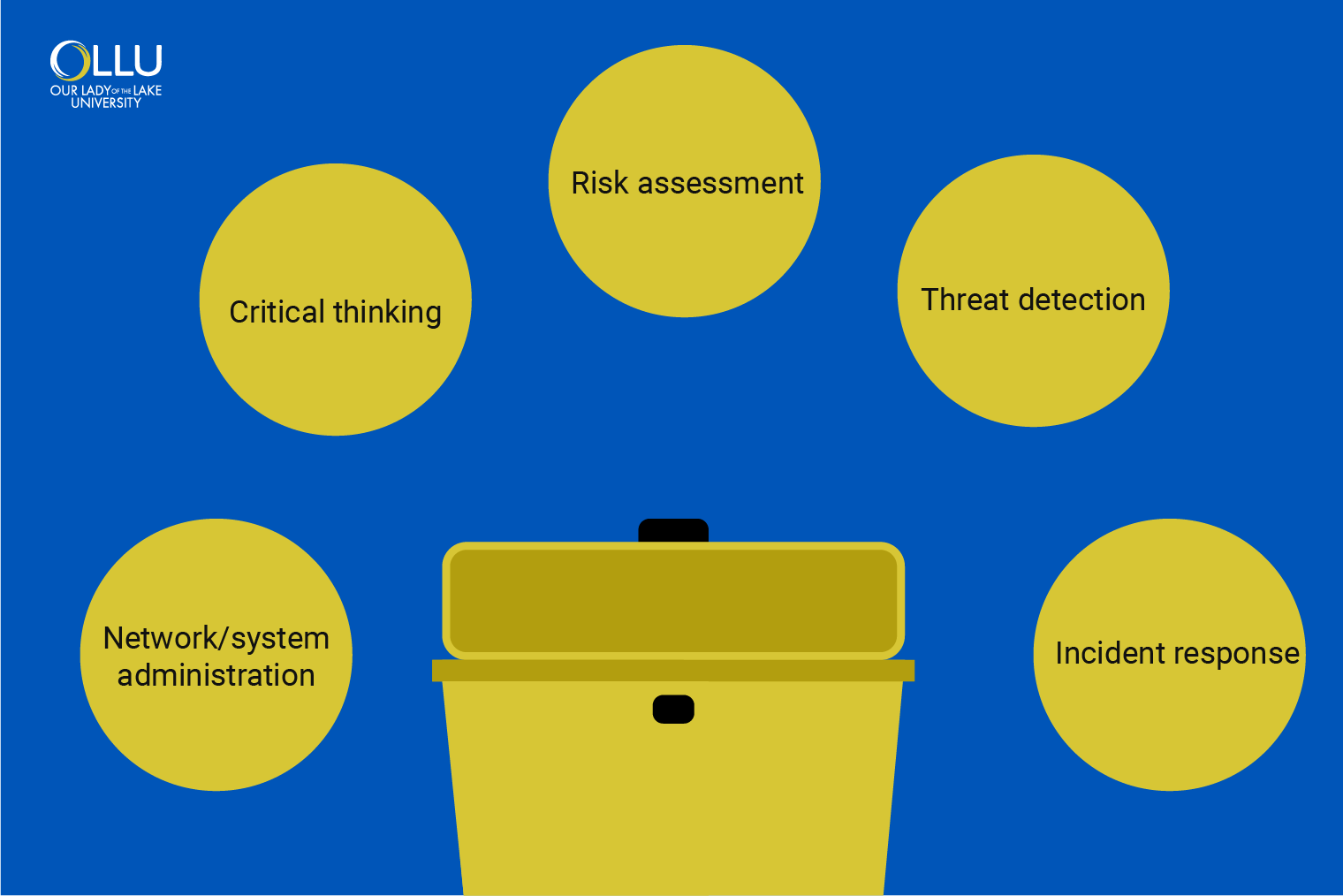Cybersecurity 101: How To Get Into Cybersecurity
Nov 06, 2023

Cybersecurity is a rapidly growing and well-paid field in the current job market. As the world transforms into a digital ecosystem, organizations are seeking professionals who can devise foolproof methods to secure their infrastructures from threats. Enter cybersecurity experts! And the best part about this career? It is still an unsaturated niche with plenty of room to grow and you don’t even need previous experience.
If you are confused about where to start or how to break into cybersecurity, put your cyber glasses on and let this article guide you down the path.
What Is Cybersecurity?
Cybersecurity refers to a set of practices that are designed and implemented by organizations to protect their systems, networks, or resources against cyberattacks. Some common types of digital attacks include malware, phishing, ransomware, or Distributed Denial-of-Service (DDoS). However, this list can be non-exhaustive (no thanks to sophisticated hackers), and that is why organizations need to be well-prepared for worst-case scenarios.
In simple terms, cybersecurity prevents data breaches. An unauthorized breach can cause immense financial losses to a company, not to mention the irreversible jab in their reputation and potentially ensuing lawsuits from customers. Hence, a solid cybersecurity framework is a non-negotiable for businesses.
Why Is Cybersecurity Important?
According to the FBI’s Internet Crime Report from 2022, there were a total of 800,944 cyberattack complaints reported by the public. The cost of such data breaches can cost hefty dollars for companies, amounting to millions or trillions.
For better context, consider the following example. As an individual, you might use authentication methods like 2FA to prevent hackers from accessing your social media accounts. Now imagine the same implications on an enterprise level where hackers could illegally access the sensitive data of millions of people through one single company database. A recipe for disaster, isn’t it?
A skilled cybersecurity professional can help implement the right set of measures to safeguard companies against malicious activities.
Cybersecurity Career Paths
Let’s dive into the most important question: What are the cybersecurity career paths available to you?
An entry-level role in cybersecurity, usually as a cybersecurity analyst, network administrator, or information security analyst, does not necessarily require a technical degree. However, if you are a novice in the IT industry, a cybersecurity degree or certification will help kickstart your career by providing the basic tools and skillsets required to enter the field.
Professionals working in SecOps, software development, helpdesk, risk analysis, or other IT fields can find themselves better positioned to transition into cybersecurity due to their technical acumen.
As you progress into mid or senior-level roles in the field, the career arc will depend largely on your skills, experience and preferences. Highly specialized executives hold management positions, with job titles such as chief information security officer.
Here are some popular domains to be explored within the cybersecurity field:
- Information security
- Network administration
- Penetration testing
- Incident response
- Security/systems engineering
- Cryptography
A lot of these niches overlap with each other, enabling professionals to apply their transferable skills across various other fields.
Cybersecurity Salaries
Cybersecurity attracts considerable interest due to its appeal as a high-paying career option. Although salaries can vary greatly depending on location, company and experience, it remains one of the most lucrative fields in the IT industry.
In the United States, an entry-level cybersecurity professional can expect an average salary of $75k per year, while senior executives can easily get an annual package totaling more than $147k per year.
Cybersecurity Job Outlook
According to the U.S. Bureau of Labor Statistics (BLS), the growth of IT occupations is projected to skyrocket between 2022 and 2032. Cybersecurity careers like information security analysts are expected to be in high demand in the upcoming decade. This does not come as a surprise, considering companies value their data and are willing to invest in security measures to protect resources.
Another factor that fuels this demand is that artificial intelligence (AI) cannot fully replace cybersecurity professionals. While tasks can be automated, there is no doubt that human intuition, critical analysis and decision-making skills are invaluable in a field where a simple error can cost fortunes, thus strengthening the demand.
How To Get Into Cybersecurity

Cybersecurity is an increasingly important and in-demand field. Here’s a step-by-step guide to help you get into cybersecurity:
Earn a degree
Although not a prerequisite, a degree in cybersecurity is highly recommended for graduates or professionals looking to transition into this field. A bachelor’s or master’s degree in cybersecurity is the easiest path to get access to entry-level positions in companies.
Many universities offer on-campus as well as online cybersecurity courses to suit the flexibility of students.
READ: OLLU Master of Science Degree in Cybersecurity (online) ranked one of the top in the U.S.
Gain experience
Equipping yourselves with the required skills is crucial to getting an entry-level cybersecurity role. Most positions require at least one year of experience in similar fields.
If you are coming from a non-IT background, the next step after getting a certification or degree can be an internship. This is the traditional way of breaking into the field and gaining hands-on experience, ensuring a smoother transition to permanent positions.
If you already work in an IT field, you are at an advantage. Leverage your existing skills and determine how they can be applied to any of the cybersecurity niches. You can also get certifications to polish your resume and stand out in the candidate pool.
Acquire certifications
Certifications are highly valued in the cybersecurity field. Many people choose to bypass a degree and opt for recognized certifications, especially experienced professionals transitioning from other career streams. Here are some of the top cybersecurity certifications:
Certified Information Systems Security Professional (CISSP)
Offered by ISC2, this is one of the top credentials for professionals with over five years of experience in the cybersecurity field. Due to its difficulty level, passing the exam is a sure-shot way to bagging the seniormost positions in the hierarchy.
Certified Information Security Manager (CISM)
Administered by the Information Systems Audit and Control Association (ISACA), this is another renowned certification preferred by IT professionals looking to advance into management positions. The accredited program fetched an average pay increase of 42% to its holders and it’s recognized by recruiters around the globe.
Certified Information Systems Auditor (CISA)
CISA certification provides the holder with the skills and credentials required to audit and monitor the security of an organization’s computer systems. Professionals with at least five years of experience in the field of auditing or security control are eligible to apply for this program and subsequent exam.
Must-Have Cybersecurity Skills

When selecting a cybersecurity degree or looking to transition into the field, a common question that pops up is: “What are the skills that I must have to get into cybersecurity?” It is relevant, considering cybersecurity has various domains, and it can get confusing for a beginner. Here are the top five skills that a cybersecurity professional must have to break into the field:
1. Network/system administration
2. Critical thinking
3. Risk assessment
4. Threat detection
5. Incident response
It is important to note that these skills are often necessary in the context of entry-level positions. However, the required skills will also vary depending on the specialization that you pursue within cybersecurity. For example, entry-level roles do not require coding, but it can be a beneficial skill to progress into senior positions.
Cybersecurity Bootcamps
Bootcamps offer focused and intensive training programs designed to equip participants with essential skills for transitioning into a new field swiftly. While they provide valuable hands-on experience and can be quicker than pursuing a degree, it’s crucial to understand that bootcamps are not equivalent to a formal degree in depth or recognition. But if you're looking for a time-efficient alternative to a degree, bootcamps might be a suitable option for you.
The Bottom Line
The tech industry is booming. If you have an interest in technology and possess (or are willing to learn) the skills required to break into a new field, cybersecurity is the perfect career choice for the upcoming decade.
Frequently Asked Questions (FAQ)
Is cybersecurity hard to get into?
It can be challenging for novices in the IT field. However, the right technical skills, degrees and certifications can help professionals get into cybersecurity.
Can you get a job in cybersecurity without a degree?
Yes, you can get a job in cybersecurity without a degree. However, having a degree can significantly enhance your prospects, credibility, and potential for career advancement. While relevant certifications and hands-on experience are essential, a formal education can provide a comprehensive foundation and is often favored by many employers.
How to get into cybersecurity with no experience
Previous experience can help, but it is not necessary to get into cybersecurity. A degree or certification along with some real-time project experience can grant you an entry-level position.
How to get into cybersecurity if you come from a different field
Many professionals transitioned into cybersecurity from different fields with the help of educational programs. If you’re already working in the IT industry, network around to determine whether your existing transferable skills can be leveraged to get into cybersecurity.
How to get into cybersecurity if you have an IT background
With an IT background, you’re well-equipped to transition into cybersecurity. Obtain necessary certifications and set up a home lab to practice and refine your skills. Networking within the cybersecurity community can further enhance your opportunities.
How to get experience in cybersecurity
You can get experience in cybersecurity through internships or real-time project experience obtained through education programs.
How long does it take to get into cybersecurity?
It depends on your experience. Ideally, a degree or certification course can range anywhere from six months to two years. However, if you are already in a closely related IT field, a month or two should suffice to curate your resume and transition into cybersecurity.